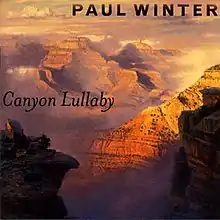Canyon Lullaby
Canyon Lullaby is an album by the American saxophonist Paul Winter, released in 1997.[2] It is the first Paul Winter album made up entirely of solo saxophone improvisations. It is also the first surround sound album to be recorded in the wilderness. The album was nominated for a Grammy Award, in the "Best New Age Album" category.[3]
| Canyon Lullaby | ||||
|---|---|---|---|---|
 | ||||
| Studio album by | ||||
| Released | 1997 | |||
| Genre | New age | |||
| Length | 60:20 | |||
| Label | Living Music | |||
| Producer | Paul Winter, Sam West, Les Kahn | |||
| Paul Winter chronology | ||||
| ||||
| Review scores | |
|---|---|
| Source | Rating |
| AllMusic | |
Background
In 1985, Paul Winter recorded Canyon in a naturally reverberant side canyon of the Grand Canyon that he nicknamed "Bach's Canyon". The album featured the Paul Winter Consort. In 1996, he returned to the canyon to create an album of solo saxophone improvisations. The album was a musical representation of a period of 24 hours in the canyon. To help create this feeling, Winter played at different times during the day and night.
Critical reception
AllMusic wrote: "Interesting and exhilarating in small doses, Canyon Lullaby can go beyond soothing to soporific if listened to in one sitting."[1]
Track listing
- "Canyon Lullaby"
- "First Light"
- "Honoring Song"
- "Canyon Chaconne"
- "Dream of the Basketmaker"
- "Air for Keetu"
- "Cornmeal Medicine Wheel"
- "Redbud Siesta"
- "Lizard Lounge"
- "Hummingbird's Ballad"
- "Afternoon Sun"
- "Waltz of the Ravens"
- "Lullaby at Pumpkin Springs"
- "Dreamcatcher"
- "Mars on the Rim"
- "Midnight Blue"
- "Moon Shadows"
- "Music Temple"
- "Rain Blessing"
- "Sweet Dreams, Little One"
- "Canyon Chaconne (Reprise)"
References
- "Canyon Lullaby - Paul Winter | Songs, Reviews, Credits | AllMusic" – via www.allmusic.com.
- "Winter Takes His Studio Outside". Billboard. Nielsen Business Media, Inc. September 27, 1997 – via Google Books.
- "Paul Winter". GRAMMY.com. November 23, 2020.